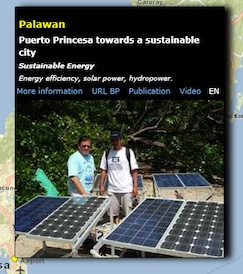Solar, hydropower, green building and transport issues in Palawan Biosphere Reserve.
 Puerto Princesa is a multiawarded and pioneer city for environmental initiatives in the Philippines. It is the capital and chief seaport and airport of the province of Palawan biosphere reserve.
Puerto Princesa is a multiawarded and pioneer city for environmental initiatives in the Philippines. It is the capital and chief seaport and airport of the province of Palawan biosphere reserve.
Solar power
In June 2010 the City of Puerto Princesa in Palawan, Philippines formed a technical partnership with Optimal Power Solutions in order to address the city’s power shortage, currently estimated at 5 to 10 MW.
An ongoing and significant issue has been the provision of sustainable energy for Puerto Princesa. At present, diesel-powered gensets provide a capacity of 30 MW of power to the inhabitants of Puerto Princesa. OPS and the City Council plan to design and implement renewable energy sources to generate additional power supply, reduce diesel fuel consumption and promote a viable and sustainable energy future. It is envisaged that new renewable sources of up to 10 MW capacity will be integrated over successive phases. This renewable capacity will prioritise the export of photovoltaic power into the grid to better support and lower use of the current diesel generators. Phase One of 1 MW capacity progressing up to 2MW, 5MW and finally 10 MW providing for future load growth of the City.
The systems will combine solar photovoltaics, inverter control technology, battery storage and diesel engines configured for 24-hour continuous power supply. The inverter technology will employ specially developed SCADA software for real time control management of the photovoltaic/diesel systems. This proprietary SCADA is currently in use in multi-megawatt grid-connect projects in India and has proven highly invaluable for real-time, remote monitoring of power generation and general system trends.
Hydropower
The twin 3.4MW hydro-turbines provide at least 32 million kwh of electricity to the Palawan grid. Hydropower will replace the old and expensive to run NPC generators that have a short-term contract with the Palawan Electric Cooperative.
More energy-efficient homes
The rising urban population of Puerto Princesa has led to congestion in the city’s bay area, threatening the people’s quality of life and coastal reserve areas. Housing projects on the coast in Puerto Princesa City have been designed to reduce energy demand through increased natural light, improved ventilation, the cooling effect of the roofing material and strategically planting at least one fruit tree per household. The potential annual carbon savings is estimated to be at least 72 tonnes for the 330 households. Other green features of the housing projects include the installation of a rainwater catchment facility that reduces the demand for water pumping, prohibiting the use of wood for the roof and interior frames and an appropriate disposal system for non-recyclables and non-biodegradables.
Greening public transport
The local government of Puerto Princesa has entered a partnership with Institute for Climate and Sustainable Cities (iCSC), a non-government organization based in the Philippines working on “sustainable energy solutions and fair climate policy.” This partnership is under the Climate-Friendly Cities initiative of the iCSC, an initiative which combines “waste management, renewable energy generation and sustainable transport programs for sustainable, climate-resilient city and community development.” Currently, Puerto Princesa has electric jeepneys (e-jeepneys) in its public transport fleet as well as electric tricycles (e-trikes), which are makeshift three-wheeled vehicles from motorcycles. The concept of e-jeepneys was developed by iCSC through a funding by Dutch foundation, Stichting DOEN. E-jeepneys were introduced in Puerto Princesa in 2009, with political cooperation playing a major role in the institutionalization of the electric vehicles as public transport.
Related links:
Sustainable Urban Energy Planning | ICLEI – Local Governments for Sustainability, UN-HABITAT and UNEP | PDF
Optimal Power Solutions partnership
Langogan Power Corporation















